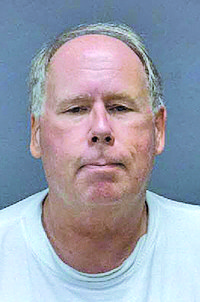FORT SMITH -- The federal government fabricated its criminal case against James Bolt to get even with him for losing its prosecution against him in a 2007 case, Bolt's attorney testified in federal court Thursday.
Herbert Southern of Fayetteville said that was the defense Bolt wanted him to prepare in response to the government's 14-count superseding indictment against him charging wire fraud, mail fraud and money laundering.
As part of the fabricated case, Southern said, Bolt claimed the FBI planted an undercover agent named Leah Cleveland in his business Situs Cancer Research Center in Rogers. FBI Special Agent Robert Cessario testified Wednesday he questioned staff members of Situs but no one had ever heard of her. He also couldn't find such a person in the bureau's data bases.
At one point, Southern said, Bolt asked to be released from jail prior to his trial so he could search for Leah Cleveland.
Her name appeared on various documents used to recreate fraudulent donation agreements Bolt created and submitted in California and Nevada to obtain more than $2.5 million in unclaimed assets. U.S. District Judge Timothy L. Brooks, who sentenced Bolt to prison in June 2014, said Leah Cleveland was a fictitious person created by Bolt.
In the 2007 case, a federal court jury in Fayetteville acquitted Bolt and three other men of conspiracy and fraud charges in what the government called an investment fraud scheme. The government claimed people were lured to invest in a company called Shimoda-Atlantic claiming to have developed a drug for cardiovascular disease, eczema and herpes zoster.
Southern said he represented Bolt in the Shimoda-Atlantic case.
Testimony ended Thursday in the two-day hearing before U.S. Magistrate Mark E. Ford on Bolt's motion to vacate his sentence because of ineffective counsel by Southern and Bolt's appeal attorney Drew Miller of Rogers. Bolt was sentenced to 100 months in prison, was fined $50,000 and ordered to pay more than $2.5 million restitution.
Ford said he will draw up a report and recommendation on Bolt's motion in the next 60 days and pass it on to Brooks, who will make the final decision.
Bolt said in the motion Southern was a plant for the FBI on his case in that he worked with Cessario on an earlier investigation Southern testified had no relation to the charges against Bolt. Southern also had a conflict of interest, Bolt said, because of his relationship with Cessario, who was the lead investigator in the case against Bolt.
Southern testified he told Bolt about his relationship with Cessario on the day he agreed to represent Bolt. Bolt thought the relationship could help him in his case and signed a waiver of conflict of interest.
The motion also charged Southern took property of Bolt and Situs. Southern testified Bolt's mother and girlfriend took the property from Bolt's home and the Situs office and he received two checks from Bolt totaling $5,200 for his representation of Bolt.
Bolt charged Miller with ineffective counsel for not appealing what Bolt believed was the government's violation of the plea agreement by supporting Brooks' intention to exceed the federal sentencing guideline range in Bolt's case. A transcript of the hearing showed Bolt agreed with the government in recommending a sentence of 57-71 months, which was within the guideline range.
In the agreement, the government agreed to recommend a sentence within the guideline range.
NW News on 09/22/2017
